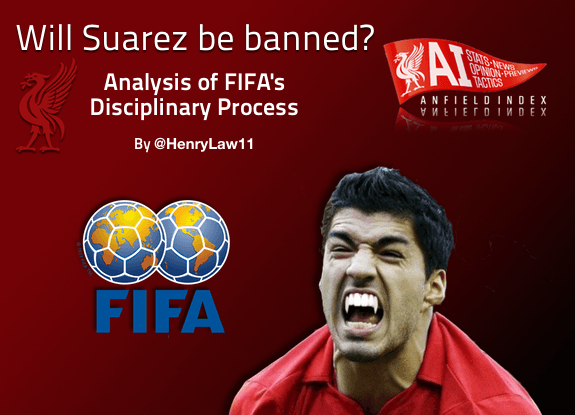FIFA’s Disciplinary Process:
Introduction:
FIFA’s Code of Ethics, Disciplinary Code and Regulations govern whether or not a player will be reprimanded for transgressions that occur in relation to their employment as a professional footballer and as a member of FIFA. The authorities of the major leagues are all members of FIFA and as such bound by their decisions in such cases. The Disciplinary Code and Code of Ethics specifically provide for the fact that they apply to all matches and competitions organised by FIFA. Any sanctions imposed by the either the Disciplinary or Ethics Committee (referred to from now on as the [relevant] Body) may or may not be confined to a geographical location or category of game (in this case World Cup/international fixtures.)
This analysis of the process has obviously been triggered by Luis Suarez and his predilection to gnawing on opposition players. While the evidence in this instance is by no means conclusive the laws of FIFA operate in such a way as to make this irrelevant. The Disciplinary Code includes sanctions for actions amounting to “attempt” which are also punishable.
The Sanction:
The Body that hands out the sanction (likely the Disciplinary Committee in this case) decides their scope and duration. The Disciplinary Code provides for sanctions having worldwide effect where sufficiently serious. This ban could be up to 24 games, which would seem extreme in light of the fact that the previous ban handed out by FIFA was 8 games and was a result of an altercation that led to a broken jaw. While this case could prove instructive in their final decision, the guidelines make it clear that FIFA are not bound by previous cases (precedent). Both The Code of Ethics and Disciplinary Code specifically refer to the possibility of repeated breaches increasing the severity of any sanctions imposed on the player/authorisation being penalised – and Suarez is unfortunately a repeat offender in this regard.
The ban could be, and very much should, be limited to international fixtures but it is possible that FIFA decide to ban Suarez from all football related activities. It is therefore within their jurisdiction to ensure that authorities responsible for domestic leagues, as members of FIFA, enforce such a ban. Thankfully there appears to be no examples of FIFA banning a player for a misdemeanour (physical, unlawful assault not causing injury) at an international tournament and enforcing that ban domestically.
Whether or not the referee saw the incident is immaterial in a case such as this. FIFA can sanction players when the referee has missed an incident but also when it is clear a referee has made a mistake.
Suarez could have an opportunity to appeal the decision and be heard by the Court of Appeal, however there are some situations, detailed by the Code of Ethics, where an appeal process will not be open to the sanctioned party. Whether or not this is legal is another issue. Suarez does have a right to be heard before any final determination is made and he also has the right to have legal representation.
Proof:
Video evidence in this case, while somewhat damning, hasn’t provided us with irrefutable proof that Suarez sunk his teeth into Chiellini. The burden of proving Suarez to be guilty rests with the relevant Body. This is good because picking holes in evidence that isn’t incontestable is much easier than trying to rely on it to prove a claim. Any proof provided, and whether or not it can be relied upon, will be decided by the relevant Body.
The standard of proof is based on the “personal convictions” of the members of the relevant Body hearing the case. You may have heard of the phrase “beyond reasonable doubt.” This is a high standard of proof as you have to be certain that the alleged act was committed. Unfortunately the standard here is closer to that of “on the balance of probabilities” which means that the members need only think, based on the evidence provided, it is more likely that he committed the act than he did not. Given Suarez’s history this is not good.
Conclusion:
Suarez will be banned but this will likely only apply to international fixtures. While his genius on the pitch astounds and he is capable of doing things other players wouldn’t even think of, he carries with him a huge amount of baggage. Whether or not this impacts his standing at Liverpool is yet to be seen but I personally hope he stays.
I will be tweeting out the relevant provisions referred to above so if you are interested in learning more follow me @Henrylaw11. You can also find them attached below.















[…] continue reading here : http://anfieldindex.wpengine.com/9000/analysis-fifas-disciplinary-process-will-suarez-banned.html […]
Thanks for the analysis. If you’re right and Luis is ‘only’ banned internationally, I think FSG and FA will still feel a ton of pressure to suspend him for a number of domestic fixtures as well. Perhaps Cup fixtures would do the trick; probably not enough for the press though.
Interesting analysis.
My personal view is that LFC should fight any attempt to ban Suarez domestically.
LFC sent a player they have worked hard to reform in good faith to play for his country, Uruguay were responcible for the player at that point and it can be contested that LFC would not have allowed Suarez emotional state to reach the heights it did. Whereas it can also be argued that Uruguay fired him up even more going into this make or break match.
[…] 57[3], and Article 77[4] of the FIFA Disciplinary Code. I pointed out in my previous article (Will Suarez be banned?) that there was a possibility Suarez could be barred from taking part in “all football related […]
[…] 57[3], and Article 77[4] of the FIFA Disciplinary Code. I pointed out in my previous article (Will Suarez be banned?) that there was a possibility Suarez could be barred from taking part in “all football related […]